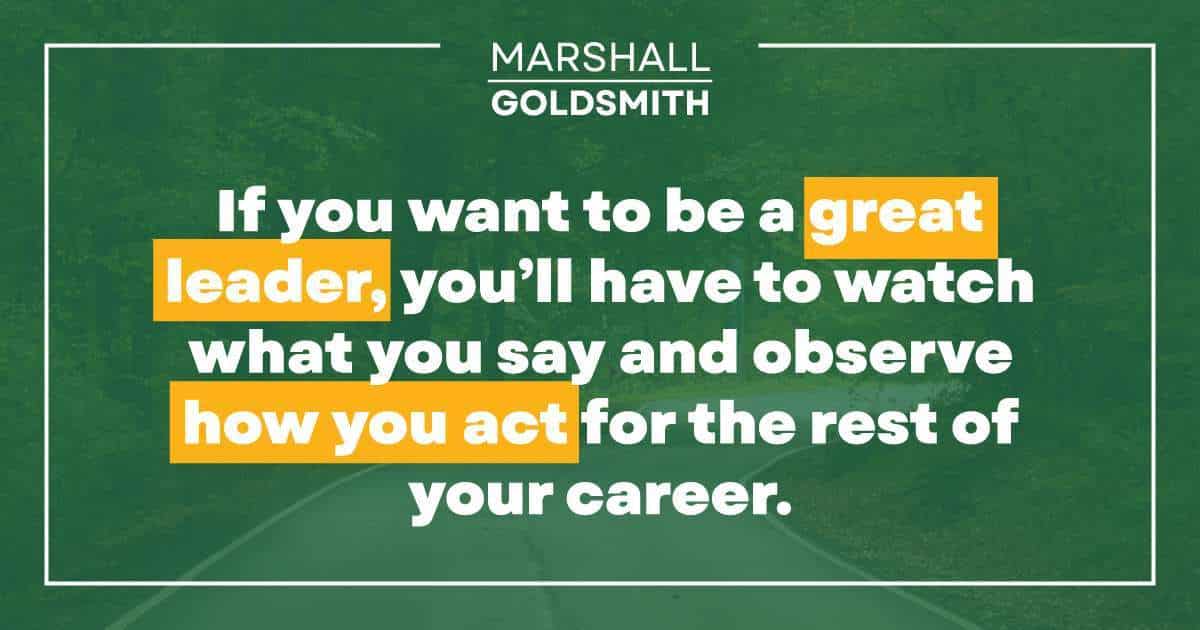Playing Favorites By Marshall Goldsmith There’s a reason I devote...
There’s a reason I devote so much energy to addressing interpersonal challenges in successful businesspeople: The higher up they go, the more their problems are behavioral.
At the top levels of an organization, all of the players are technically skilled. They’re all very smart, and they are up to date on the key concepts and issues involved with the enterprise and their roles in it.
For example, you don’t get to be, say, a chief financial officer without knowing how to read a balance sheet, digest the various figures and assess the firm’s fiscal situation.
That’s a big part of the reason why behavioral matters become so much more critical as you climb up the upper rungs of the corporate ladder. All other things being equal, your people skills (or lack thereof) become more pronounced the higher up you go. In fact, even when things are not equal, your people skills often make the difference in determining how high you go.

Let’s consider a hypothetical choice: Would you rather have a CFO who is a pretty good accountant and a very skilled manager or a brilliant bean counter who alienates almost everyone under him?
It’s not a tough choice, really – the candidate with superb people skills will win out every time, mostly because of the fact that he’ll be able to hire people who are smarter with money than he is, and he’ll be able to lead them. The odds of the virtuoso accountant being able to do that aren’t very good.
Think about the successful people you know. When you consider how they got to be that way, do you attribute it to their sheer technical expertise? Probably not.
Oh sure, you likely can attest to their knowledge of what they do. Again, they would have to be smart to succeed at that level, but that’s almost certainly not the only factor. It’s probably more precise to say they’re smart and something else.
And that “something else” is what really sets them apart because, at some point, we give them the benefit of the doubt on skill issues and look at other characteristics.
For instance, we assume our doctors know medicine, so we judge them on bedside manner – how they tolerate questions, deliver bad news and apologize for keeping us in the waiting room too long. This stuff isn’t taught in medical school.
We all have certain professional credentials that land us our first few jobs – these are the kinds of accomplishments that go on our resume. But as we become more successful, those fade into the background, and other characteristics come to the fore.
Take Jack Welch. He received a doctorate in chemical engineering, but I doubt any of the problems he encountered during his last three decades at General Electric were in any way related to his comprehension of chemical titration or formulating plastics.
While he was vying for the CEO job, the things holding him back were strictly behavioral: his brashness, his blunt language, his unwillingness to suffer fools lightly. (Obviously, he didn’t pick these issues up from the University of Illinois’ chemical engineering labs.)

Instead, GE’s board of directors worried about how he would act as CEO. The main considerations were behavioral – the board was not concerned about his ability to generate profits.
For another example of behavior trumping technical skills and knowledge, look no further than Bill Gates. The Microsoft founder hasn’t actually developed software in decades. Indeed, he has made his company what it is today through shrewd business moves that had little to do with his technical prowess.
On the flip side, coping with Gates’ idiosyncrasies has been one of Microsoft’s challenges. His sometimes confrontational, brook-no-opposition style has put off more than its share of employees. (Of course, one could say nearly all the same things about Apple’s Steve Jobs.)
When people ask me if the leaders I coach really can change their behavior, my answer is this: As we advance in our careers, changes in behavior are often the only significant changes we can make.

Adding Too Much Value Won’t Get You There By Marshall...
C-Suite Master Class: No, But, However By Marshall Goldsmith Continuing...
The Doerr Institute: Expanding the Market for Coaches By Marshall...
Making Leadership Development Part of the College Degree at Rice...
Sanyin Siang – Winner of the Thinkers50 Marshall Goldsmith Coaching...
Thinkers50 Marshall Goldsmith Distinguished Achievement Award in Coaching – Nominees...
Leading with Influence: What Is Influence360°? By Marshall Goldsmith Founder...
Are You a Dominator, Manipulator, Persuader or Influencer? By Marshall...
Leading with Influence: Redefining Modern Influence Part 2 By Marshall...
My mission is simple. I want to help successful people achieve positive, lasting change and behavior; for themselves, their people, and their teams. I want to help you make your life a little better. With four decades of experience helping top CEOs and executives overcome limiting beliefs and behaviors to achieve greater success, I don’t do this for fame and accolades. I do this because I love helping people!
As an executive educator and coach, I help people understand how our beliefs and the environments we operate in can trigger negative behaviors. Through simple and practical advice, I help people achieve and sustain positive behavioral change.